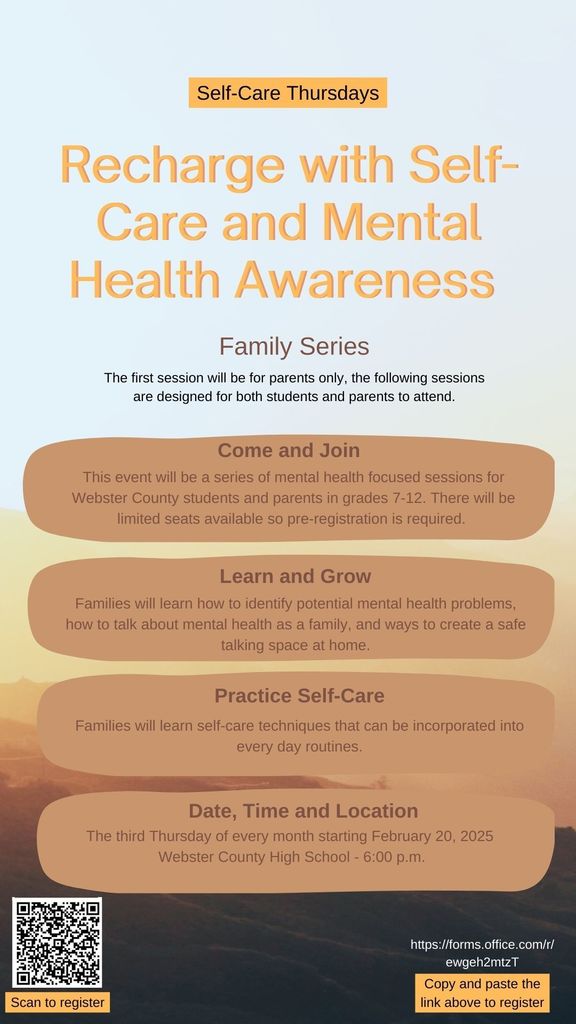Webster County Teacher of the Year nominations are now open. The survey should take less than 2 minutes to complete and is available at https://forms.office.com/r/WnZx1hzWzb. Please submit your nomination by Sunday, April 13, 2025.

Parent guidance offers free coaching to families., no insurance information is required. Coaches check in weekly or bi-weekly with families during a desired time that works for the family. At this time, we have very few families utilizing this free resource. Please check out parentguidance.org to see all the resources offered or register for coaching using the QR code or visiting https://cookcenter.info/coaching

Parent guidance offers free coaching to families., no insurance information is required. Coaches check in weekly or bi-weekly with families during a desired time that works for the family.
At this time, we have very few families utilizing this free resource. Please check out parentguidance.org to see all the resources offered or register for coaching using the QR code or visiting https://cookcenter.info/coaching

There will be a volunteer training with fingerprints/ background checks on Tuesday, February 25th at 6:00 at Webster County High School. Please make sure to fill out the Volunteer Application online.

Canceled due to 0 registrations.

The deadline for submitting the Promise Scholarship application and FAFSA is Saturday, March 1, by 11:59 pm. There will not be an extension this year. Students can review their status by logging into their WVSAM account. Please contact your school counselor if you need help.
WCHS student council is sponsoring a comfort campaign. They are collecting new pillows and new or gently used pillowcases and blankets to donate to local children. Donations can be dropped off at Webster County High or given to any student council member until March 7, 2025.

Webster County middle and high school families,
Please join us for a family engagement series focused on mental health and well-being. You must pre-register for this event. The first session will be for parents only, the following sessions will be for both parents and students to attend together.

Good evening. This is an important announcement regarding a bus cancellation for tomorrow Monday January 27th. Bus 03 in the Webster Springs area will not be running in the morning or evening. Again bus 03 will not be running tomorrow Monday 27th. Thank you. Have a good evening.
Free coaching for families available.

Attendance data - a weekly comparison. There is an increase of ADA in all schools in Webster County. #9isfinebutlessisprime #attendancematters



Just a reminder for all homeschool families. An assessment is required annually and must be retained by the parent for at least three years. If you would like your child to participate in the WV Summative Assessment programs (WVGSA for grades 3-8 or College Board's SAT School Day for grade 11), you must submit the Request to Participate form no later than Thursday, December 12th, 2024. For a student to participate in the WVGSA 3-8 or the Digital SAT School Day exams they must be approved, and the WVDE must upload their data into the assessment platforms. You may register to participate at the following link: https://forms.office.com/r/Yrp3cydtsv
Coaching for parents resource.

Superintendent Arbogast and the Webster County Board of Education would like to thank Bill Lake and Lake Lumber for the removal of the tree debris at Hacker Valley Elementary School. Your support is greatly appreciated.
This Wednesday, October 16th will be a Professional Learning Day for staff. There will be NO SCHOOL for students.
There will be a volunteer training tomorrow at 6:30 at Webster County High School. There will be other trainings coming up in the year as well for those unable to attend. This year, the Board of Education has made provisions to cover the cost of the fingerprint/ background checks on a first come first serve basis. All volunteers, new and returning must complete the volunteer form on the board website under parent forms. Volunteers who attended the training and completed the background check last year will not need to attend. Training and background checks are good for three years.
This Friday, October 4th, there will be a two-hour early dismissal for students in grades 4-12 for Faculty Senate. Grades K-3 will not have school to provide time for parent meetings to write Individual Reading and Math Learning Plans as per HB 3035.
Pre-K students do not attend school on Fridays.
Webster County Schools would like to provide parents with resources regarding mental health, bullying, and suicide prevention. The West Virginia Department of Education has partnered with ParentGuidance.org to provide free resources to all West Virginia families. This resource includes an “Ask a Therapist” component as well as courses that families can take on line to help gain knowledge regarding many subjects that parents face each day, but directly regarding the challenges students and families face.
Available, free courses that may be helpful to our community include:
• grief and loss
• Parent support
• Bullying
• Suicide prevention
• Anxiety & depression
Parentguidance.org also has Parent Coaching resources that gives families free access to an individual that can provide coaching for your specific needs, the coaches check in on a reoccurring basis to allow follow up, continued guidance and ongoing support.
Suicide and Crisis Lifeline: 988
Webster County Schools will be dismissing early tomorrow, September 26th in order for staff and friends to pay respects in honor of the recent passing of a student.
Dismissal times are as follows:
Hacker Valley Elementary School: 11:00
Webster Springs Elementary School: 11:00
Glade Elementary School: 11:10
Webster County High School: 11:30

To the Parents and Families of Webster County Schools:
This morning, we experienced the tragic loss of one of our students. We are all heartbroken and extend our prayers and sympathy to everyone that this has had an impact on. At this time, we have multiple counselors on site at Webster County High School to provide counseling services to students. These services will continue until 6:00 this evening and for the remainder of this week. If you, as the parent/guardian, feel that it is in your child's best interest to go home, you may come to the high school and sign your child out. School will operate on a normal schedule today with buses running their normal evening runs. If you have any questions, please feel free to contact Webster County High School at 304-226-5772.
Respectfully- Joseph Arbogast, Superintendent Webster County Schools

